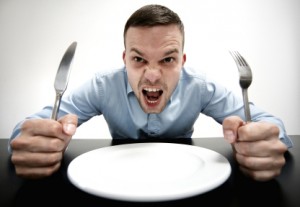Is Fasting Useful For Health Or Weight Loss?

I’m definitely more of a ‘live to eat’ rather than ‘eat to live’ type of gal. If there’s one thing I really and truly hate to do, it’s skip a meal, and believe you me, you’d hate to be around me if that ever does happen. Which it pretty much doesn’t – after all, I’ve always been quite smug in my knowledge that skipping meals only leads to a slower metabolism. That’s what I’ve been taught, and that’s the message I’ve been preaching.
So you can understand that I’m starting to feel a little miffed. I don’t know if the universe is trying to tell me something, or if there’s some kind of topic of the moment thing going on that I’m not in on, but it seems fasting is suddenly where it’s at.
To be honest, I really don’t know why I haven’t been open to the idea previously. If you’ve visited me here more than once or twice you’ll know that my ideas about nutrition stem from getting back to basics. Learning how to eat in the way that our caveman ancestors did (spear optional) in order to create a lean physique, vibrant energy, and exceptional health.
And if you think about it, there’s nothing new about the concept of occasional fasting. After all, there really is nothing overly ‘motherly’ about Mother Nature, is there? The term conjures up an image of a protective benevolent type; 3-course meal in hand. Yet if you were to spend even a week lost in nature you’d likely soon find yourself forced into a fasting situation, and there’d be jack-all you could do about it. Of course if you decided to set up camp permanently, maybe join a tribe and go a-hunting, I’m sure you’d figure out where the food was. But that’s not to say it would be readily available in time for dinner.
We’ve been programmed to believe that, while going hungry is one thing, skipping right through a meal or two is just foolish. In fact, a medical journal I came across last week backed this up fairly avidly:
“One of the worst things that you can do for your body in terms of detoxification is doing a fast. That was the idea about 20 or 30 years ago, but we know now that your body actually needs specific nutrients to be able to perform its job of detoxification.”
And why would we bother fasting anyway, with 24-hour stores a-plenty and the cupboard always a handy back-up? A quick search on Google gives you plenty of data both for and against, with the benefits of fasting ranging from detoxification, to will-power, even to spiritual enlightenment. And the naysayers predicting you’ll only end up putting on more weight in the end, and that any weight you do lose will just be water weight.
But according to Mark Sisson of Mark’s Daily Apple, skipping meals may even be healthy, is actually very natural, and could even contribute to greater results in your quest for health and wellness. And, as much as I hate to admit being wrong, I’m starting to sway my thoughts in the same direction. How can I promote a back to basics approach to nutrition without taking into account the ups and downs of feeding oneself in nature? Just doesn’t make sense, does it?
Of course the proof is in the pudding (or lack thereof), and that’s where we need to lay down a couple of important ground rules for successful fasting.
- It’s still not okay to routinely skip meals (such as breakfast) just because you’re busy or tired, and then load yourself up on poor quality foods for the rest of the day.
- This is partly because the whole concept of fasting in nature is that it is sporadic, controlled in large part by the seasons, your hunting skills and the prey available, and perhaps the generosity of your fellow tribes-men. Skipping a certain meal each day is just a bad habit and does not count.
- If you’re not eating right in the first place, you’re not going to benefit greatly from fasting. Were you to live on the land, you’d have little choice about what to eat and would enjoy a diet of animal meats, fats, the occasional veg, and perhaps some nuts, seeds and berries. If you’re currently living on processed foods, take-aways, lots of whole-grains and starches, with plenty of fruit and just the occasional serve of lean protein, then you’re not adequately equipped to benefit from complete fasting.
- Food fasts and water fasts are not the same thing. Keep your fluids up if you do try skipping a meal.
- Don’t assume you can’t be active. Conventional fasting wisdom tells us to rest when we fast, but how natural is that? I can’t imagine I’d be taking it too easy if I lived on the land and was out of food. Would you? Of course you don’t have to shoot for any world records that day, but follow your normal routine.
Have you ever tried fasting or thought about fasting? What have your experiences been?

The only time I’ve fasted is during Ramadan. Usually I wake up early in the morning eat a small to medium breakfast then start my fasting. No food or water during the day, then once the sun sets I usually eat a limited portion dinner (despite my raging hunger).
What usually happens during this month is I lose around 10-15 lbs then gain some of those pounds back within 5-7 weeks. This is usually the trend. What has me worried is what fasting without food or water is going to do to my body. I’ve started exercising regularly (using HIIT & body weights circuits) six months ago and lost around 25 lbs. I don’t want to mess up all the hard work I’ve done and I don’t really want to skip fasting.
If you have any ideas on what I can do to keep my metabolism and losing my muscle mass, please let me know.
This is a tough one. Fasting for many days at a time will unavoidably cause weight loss, and muscle will always be the first to go. This means that your metabolism drops and you have to effectively start over again at building it up. The type of fasting I’m talking about is for a meal, maybe two. And not without water. HIIT training and circuits are great for fat loss, but so is strength training – plus it also helps you gain more muscle. I’d recommend this as your primary source of activity when you’re not fasting – the more muscle you can build up, the more you’ll have left after Ramadan.
I’d also suggest eating more after sun-set. Not all at once, but spaced out over a few hours. With a strong focus on quality proteins and fats. This will give your body reassurance and keep your metabolism ticking over nicely.
Fasting, as per Indian standards, does not mean going completely without food. Fasting would imply having at least one meal, prefereably dinner. We are expected to consume fruits, milk and, ofcourse, water through the day. I have tried this occassionally and always feel good the next day. I’m a lot more peaceful and my concentration increases. My two cents 🙂